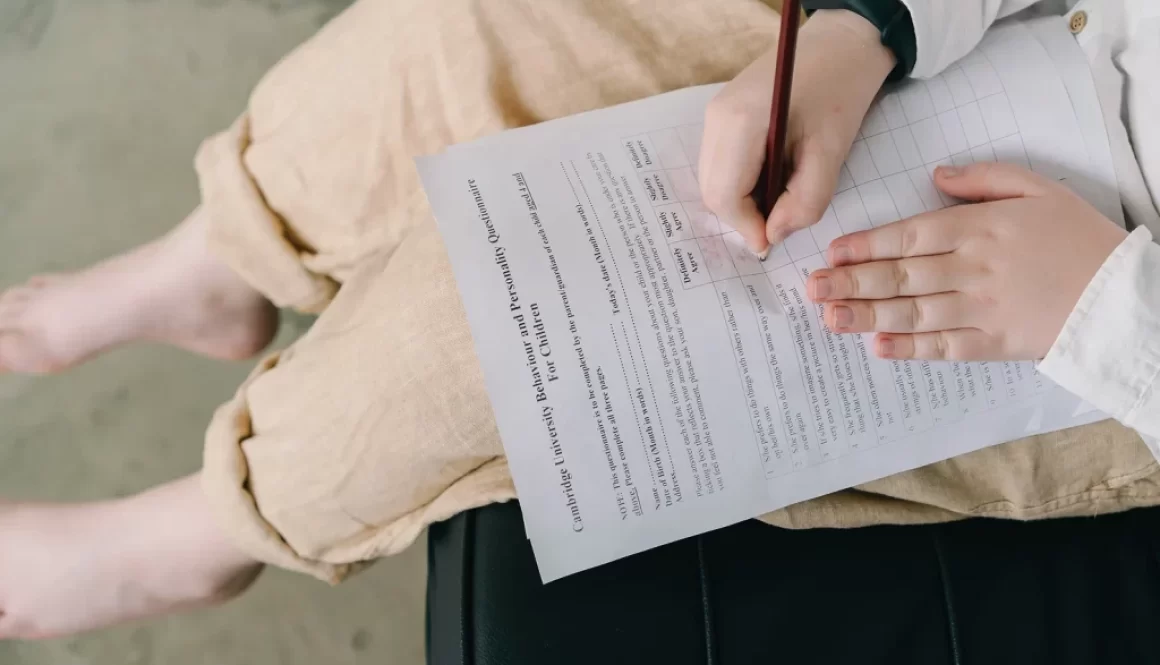ADHD Diagnosis: The what, how & WHY?
ADHD evaluations. Who needs them? What should you expect? And how might an ADHD diagnosis help your child regain their self-esteem?
Interruptive behavior at school? Difficulty preparing for activities or handing in homework? Outbursts, the really frustrating kind for you and them? Have any or all of these things been happening in your home, and you find yourself going… “Should I test my child for ADHD”? “What exactly does “test” or “evaluate” mean”? “Let’s say they do have ADHD. Why would I want that label”?
We’re here to answer all those tough questions and more.
ADHD Diagnosis. The “What”?
Let’s start with the “what” behind ADHD diagnoses.
What are some common ADHD-like symptoms that may be signs your child could benefit from being evaluated?
- Trouble paying attention
- Fidgety
- Difficulty sitting still
- Interruptive
- Impulsive
- Emotional outbursts
- Disorganized
- Forgetful
- Time management issues
- Hyperfocus
Children with ADHD commonly display these symptoms in above-age-appropriate amounts. The behaviors typically emerge before the age of 12 and can present in children as young as 4 or 5.
ADHD Diagnosis. The “How”?
“Ok, suppose my child ticks the boxes on many of the above. What would an evaluation look like?”
ADHD evaluations are typically done by pediatricians, specialized developmental pediatricians, child and adolescent psychiatrists, neurologists, psychologists, or neuropsychologists. An ADHD evaluation involves gathering as much information as possible from the people that help care for your child. Parents. Teachers. Social workers. Primary doctor etc. The goal is to try and gain a broad understanding of what’s going on for your child in their different environments. Home. School. Social.
The process begins with speaking to you, the parent, and taking a medical history. Topics covered include:
- Development
- Emotional and behavioral regulation
- Medical problems
- Family history of ADHD
- Family history of mental health problems
Once the initial medical history is complete, the goal is then to gather information from other areas of your child’s life. This can include reviewing school performance, collecting previous testing and evaluations, and answering standardized ADHD questionnaires such as the Conners or Vanderbilt questionnaires.
A quick evaluation may take a couple of weeks. But generally, ADHD evaluations take 2-6 months as it can be difficult to gather all the necessary feedback, obtain records, and schedule follow-up meetings.
Whatever the time frame – it’s worth the wait.
ADHD Diagnosis. The “why”?
“So why go through all the headaches and cost of testing?” “What about the ADHD label, I’m afraid of the stigma attached”?
The answer is when you know what you’re dealing with, it’s much easier to treat it and get services. Children with ADHD often suffer from issues of self-esteem. Chronically losing your assignments can feel debilitating over time. Repeatedly making silly mistakes on your homework can be maddening. Difficulty making friends leads to painful feelings of loneliness and rejection. It chips away at your child’s sense of self.
Once you and your child, however, understand these things happen because of a physiological problem, it’s a lot less frustrating. For everyone.
It also opens the door to receiving school and health resources. Untimed testing. Learning strategies. Therapy. Teacher recognition. Possible medication. And coping insights for you, the parent, on how to better help your child succeed.
Our ultimate goal is to help your child be their best self and improve his or her self-esteem. Putting a term to the problem and correctly identifying what the core issues and difficulties are (through evaluation) allows for applying targeted and effective treatments and tools to deal with it all.
Summary
- Impulsivity, self-regulation difficulties, and emotional outbursts are all potential symptoms of ADHD.
- An ADHD evaluation is recommended to help get your child recognition and resources.
- ADHD treatment and resources will help your child succeed and their self-esteem recover.

